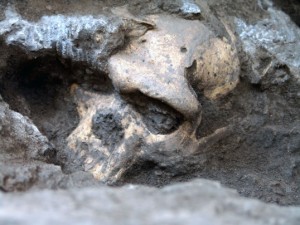New intact skull raises new questions for evolutionary principles, lead author calls for ‘rethinking what happened’
The discovery of an ancient human skull in the Asian country of Georgia dates to 2 million years ago, but so greatly resembles modern humans that evolutionary scientists are questioning continuity.
Science Magazine published a journal article titled, “A Complete Skull from Dmanisi, Georgia, and the Evolutionary Biology of Early Homo.”

This 2005 photo provided by the journal Science shows a pre-human skull found in the ground at the medieval village Dmanisi, Georgia. The discovery of the estimated 1.8-million-year-old skull of a human ancestor captures early human evolution on the move in a vivid snapshot and indicates our family tree may have fewer branches than originally thought, scientists say
The article records the discovery of a human skull found in Dmanisi, Georgia, where numerous other ancient human remains have been discovered.
“Here we report on a new cranium from Dmanisi that, together with its mandible, represents the world’s first completely preserved adult hominid skull from the early Pleistocene,” the abstract reports. “The Dmanisi sample, which now comprises five crania, provides direct evidence for wide morphological variation within and among early Homo paleodemes. This implies the existence of a single evolving lineage of early Homo, with phylogeographic continuity across continents.”
According to naturalistic dating methods, the specimen is nearly 2 million years old. Yet, despite the alleged ancient age, the skull is similar to today’s cranial structures, with differences that could fit into variation levels of modern humans.
David Lordkipanidze, lead study author for the research, admitted that the skull discovery in Georgia has forced anthropologists to reconsider long-held evolution premises regarding the history of humans across the world. As Lordkipanidze put it, evolutionary scientists are now “rethinking what happened in Africa.”
“[The skull discovery] has led researchers to a surprising conclusion: Specimens that supposedly represent several early human species might be merely different-sized individuals from the same species,” NBC News reports. “If the conclusion holds up, the skull discovery would require a major rewrite for the story of early human evolution.”
“[R]esearchers suggest that the fossil record of what have been considered different Homo species from this time period … could actually be variations on a single species, Homo erectus,” CNN explains. “That defies the current understanding of how early human relatives should be classified.”















Boy, this article is way off. The skull found has systematic differences with modern humans, including a brain less than half the size, a huge jaw and face more like apes than man. The skull simply expands the range of variation among our early ancestors.